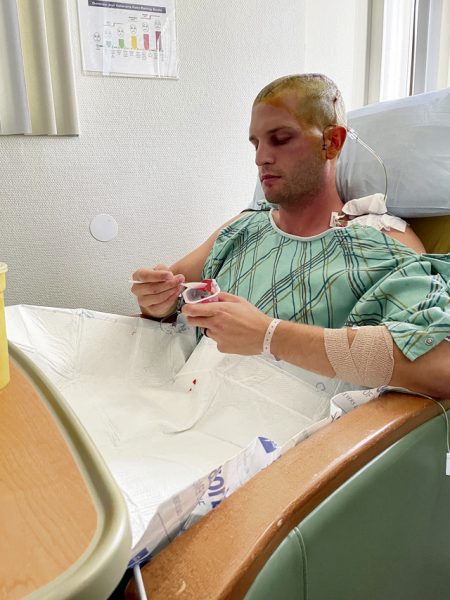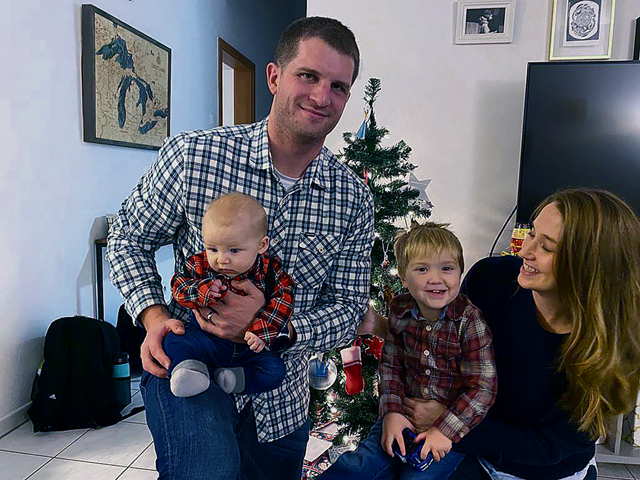
Mental health had always been a familiar topic for U.S. Air Force Tech Sgt. Paul Vermaire, 86th Operations Support Squadron aircraft controller. Growing up, he witnessed family members battling depression and suicide. Little did he know. Paul Vermaire’s life would be profoundly affected by his own struggles.
Paul Vermaire and his wife, Claire Vermaire, were eager to embrace their new life at Ramstein Air Base, Germany. From roaming through the vast amount of moving boxes scattered across their new home, to rounding up their excited son, Jonah, Paul Vermaire thought this frantic start was the cause for his brain fog.
After a couple days, what seemed like simple symptoms caused by stress cascaded into a nightmare situation.
Paul Vermaire’s cognitive abilities declined rapidly, leaving him unable to think or speak clearly. Paul Vermaire reached out to his wife for help, alarmed by his deteriorating condition uttering only two words amidst his struggle: “Mental health.”
“He was admitted to the hospital on Friday due to an unknown mass in his brain,” said Claire Vermaire. “On Saturday, he started to have excruciating pain from the abscess swelling and pressing against his brain. Then, he went into brain surgery on Sunday.”
While the successful surgery brought a sense of relief, it marked the beginning of a difficult journey for the Vermaire family..
Paul and Claire Vermaire thought he would recover quickly, yet his cognitive health was still severely weakened. He was later transferred to Walter Reed National Military Medical Center in Bethesda, Maryland.
The Vermaires spent five months living in a hotel room with only two suitcases of belongings. The chaotic environment put an incredible strain on not only Paul Vermaire’s recovery process but also on Claire Vermaire’s life.
“I was sick,” said Paul Vermaire. “I couldn’t think, I couldn’t speak, Claire had to help finish my sentences, I was in a child state of mind where I couldn’t contribute, adding to the challenges my family faced.”
“I had to be happy and cheerful for our son Jonah while trying to take care of everything but it was hard,” Claire Vermaire added “It was a very difficult time.”
Dealing with Paul Vermaire’s recovery and being stuck in the hotel due to Covid-19, the family was reaching a breaking point. But, then the military community rallied behind them.
Airmen and their families across the Air Force were moved by their story. People pooled together resources to provide anything and everything that the Vermaire family needed to make their hotel room their new home away from home.
“My sister also started an online fundraiser and we got so many totes of clothing, tons of toys, and just so much stuff that we didn’t know what to do with it,” said Claire Vermaire. “The military community love … we couldn’t have done it without them.”
However, even with the extra support, Paul Vermaire was still struggling.

He experienced months of sleeplessness and battled severe mental health issues after tapering off the steroid medication used for his recovery. Returning to Ramstein, the Vermaires hoped for a fresh start. But, their situation only worsened.
“When I got back I couldn’t sleep for two to three days,” said Paul Vermaire. “I was already depressed and having suicidal thoughts. I just thought I couldn’t get out of it, and that’s when I called my first shirt. Actually I called everyone I knew because something was very wrong.”
Paul Vermaire hoped being prescribed medications and going through an out-patient therapy course would help with the suffering he went through, but they had no effect.
Claire Vermaire said she was at the point of no return. It seemed she and her husband were delving further into their horrible nightmare with no ending in sight.
“I basically told him I wanted to leave,” said Claire Vermaire. “I want to take our son and leave. Then he said that he wanted to kill himself and we just started bawling. We finally knew how bad it truly was and we needed help.”
Paul Vermaire’s doctor suggested electroconvulsive therapy, which creates an electrical induced seizure, in the hopes the treatment would help manage his severe depression.
While frightened by the idea of leaving his family for the treatment, Paul Vermaire was more afraid of the impact his depression would have on their lives.
“It took three or four treatments to see a change, and after a few more my therapist really saw a major change” Paul Vermaire said.
Claire Vermaire added, “We knew the ECT treatments were truly making a difference for him.”
Thankfully, the treatments proved successful, and allowed the family to reunite in Ramstein. Despite their return, the Vermaires knew their lives had been irreversibly transformed by their journey.
“As a more quiet and timid person, the experience has definitely opened me up to be more vocal,” said Paul Vermaire. “I really sympathize with people with mental health issues.”
Even now, Claire Vermaire struggles letting her husband complete his own sentences.
“I’m very much a type A personality and need to have a set schedule for everything,” Claire Vermaire said. “I learned to be patient, to adapt to new situations and to have more grace.”
Paul Vermaire’s experience ignited a newfound desire within himself to speak openly about mental health. Participating in the Warrior Games through the Wounded Warrior Program helped Paul Vermaire find solace among fellow warriors who shared their stories and struggles.
“It was amazing being around others who were so open about their mental health issues or their disabilities,” Paul Vermaire said. “That’s who I want to be. I wanted to be that open, to be that gracious, and I wanted others around Ramstein to know they can be open about it.”
In a world where silence often shrouds mental health, Paul Vermaire’s journey stands as a beacon of hope. Being open, understanding, and supportive, can end the stigma surrounding mental health and foster a community where everyone feels empowered to seek help.







